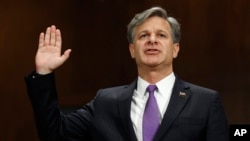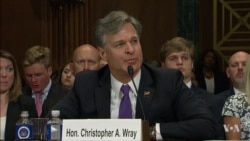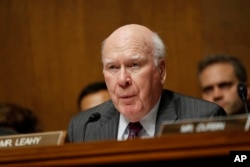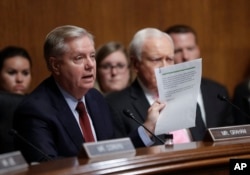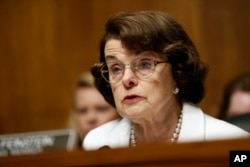U.S. President Donald Trump's choice to lead the Federal Bureau of Investigation, Christopher Wray, assured lawmakers Wednesday the agency would continue to be free of political influence as it conducts business operations, including a special prosecutor's probe into Russia's meddling in the 2016 presidential election.
“I believe to my core that there is only one right way to do this job, and that is with strict independence, by the book, playing it straight, faithful to the Constitution, faithful to our laws, and faithful to the best practices of the institution,” Wray said.
Watch: Trump's FBI Pick Pledges Independence from White House
Wray, a defense attorney and a former Justice Department official, faced questions during his confirmation hearing from members of the Senate Judiciary Committee, including inquiries about whether he can work independently from the White House.
White House deputy press secretary Sarah Huckabee Sanders said the White House was pleased with the hearing.
"During his hearing, Chris Wray continually displayed the strong character, deep knowledge and moral integrity that make him, as former Democrat Senator Sam Nunn testified, 'the leader the FBI needs at this critical moment.'"
The hearing was held as Trump faces months of multiple investigations into allegations his campaign colluded with Russian officials to help him win the White House and that he possibly obstructed justice by firing former FBI Director James Comey while leading the FBI's investigation into Russia.
In response to a question from Democratic Senator Patrick Leahy about how he would respond if the president asked him to perform a task that was “unlawful or unethical,” Wray said, “First I would try to talk him out of it, and if that failed, I would resign.”
U.S. intelligence agencies have concluded that Russia interfered in the election by launching a campaign that included planting fake election-related stories throughout social media outlets in the United States and hacking into the computer files of Clinton's campaign chief, John Podesta.
When Republican Senator Lindsey Graham asked if he questioned the agencies findings, Wray responded, “I have no reason to doubt the conclusions of the intelligence community” and added “to interfere with our election is an adversarial act.”
Wray faced questions about his relationships with Comey and Robert Mueller, a former FBI director who was appointed by the Justice Department to serve as special counsel in charge of the agency's Russian investigation. Wray worked at the Justice Department in 2004 when Comey was deputy attorney general and Mueller was FBI director.
Asked if he would inform the committee of any attempts to interfere with Mueller's probe, Wray responded, “I would consult with the appropriate officials to make sure that I'm not jeopardizing an investigation or anything like that, but I would consider an effort to tamper with director Mueller's investigation to be unacceptable and inappropriate and would need to be dealt with very sternly.”
Wray also testified the White House has not asked him for a pledge of loyalty nor would he provide one.
“No one asked me for any kind of loyalty oath at any point during this process, and I sure as heck didn't offer one,” he said.
Russia allegations
The hearings come amid new revelations about the Trump campaign's contacts with Russia last year. The president's eldest son, Donald Trump, Jr., released emails on Tuesday that indicated he met with a Russian attorney last June to discuss allegedly compromising information about Democratic presidential candidate Hillary Clinton. The emails also showed the younger Trump was told the information would be conveyed as part of the Russian government's campaign to help his father win the election.
The president has repeatedly described the Russia investigations as a witch hunt, including in a tweet early Wednesday that applauded his son's defense of his actions in a Tuesday televised interview.
Wray testified, “It would be wise to let the FBI know” about meetings with the Russian government or any other foreign actor about U.S. elections and added he does "not consider Mr. Mueller to be on a witch hunt."
“To the members of this committee, any threat or effort to interfere with our elections from any nation-state or any non-state actor is the kind of thing the FBI would want to know.”
Committee member Dianne Feinstein, a Democrat, said in opening remarks it is imperative that the FBI continue to operate without political pressure.“The FBI director does not serve the president, he serves the Constitution, the law, and the American people,” Feinstein said. “As such, the director of the FBI must be a leader who has the integrity and strength that will enable him to withstand any attempts at political interference.”
Republican committee chairman Chuck Grassley said, “There are no restrictions on the ability of any president to fire any director,” a position that has a 10-year term limit “to help prevent the FBI director from overreaching or abusing power.”
Wray must be confirmed by the full Senate before he can assume the position of director. FBI agents and lawyers who have worked with Wray describe him as dedicated and discreet with the apparent ability to avoid political influence.




